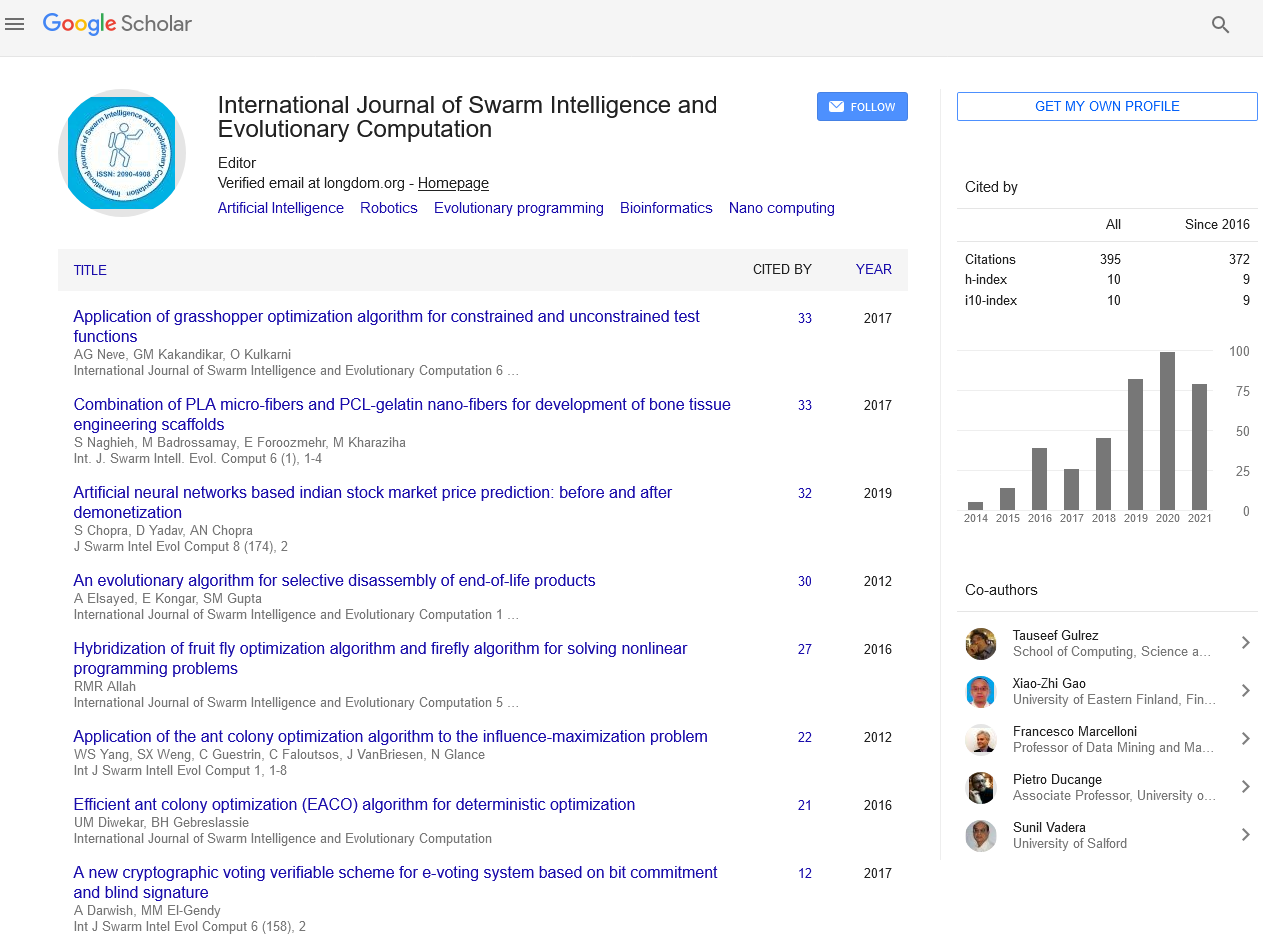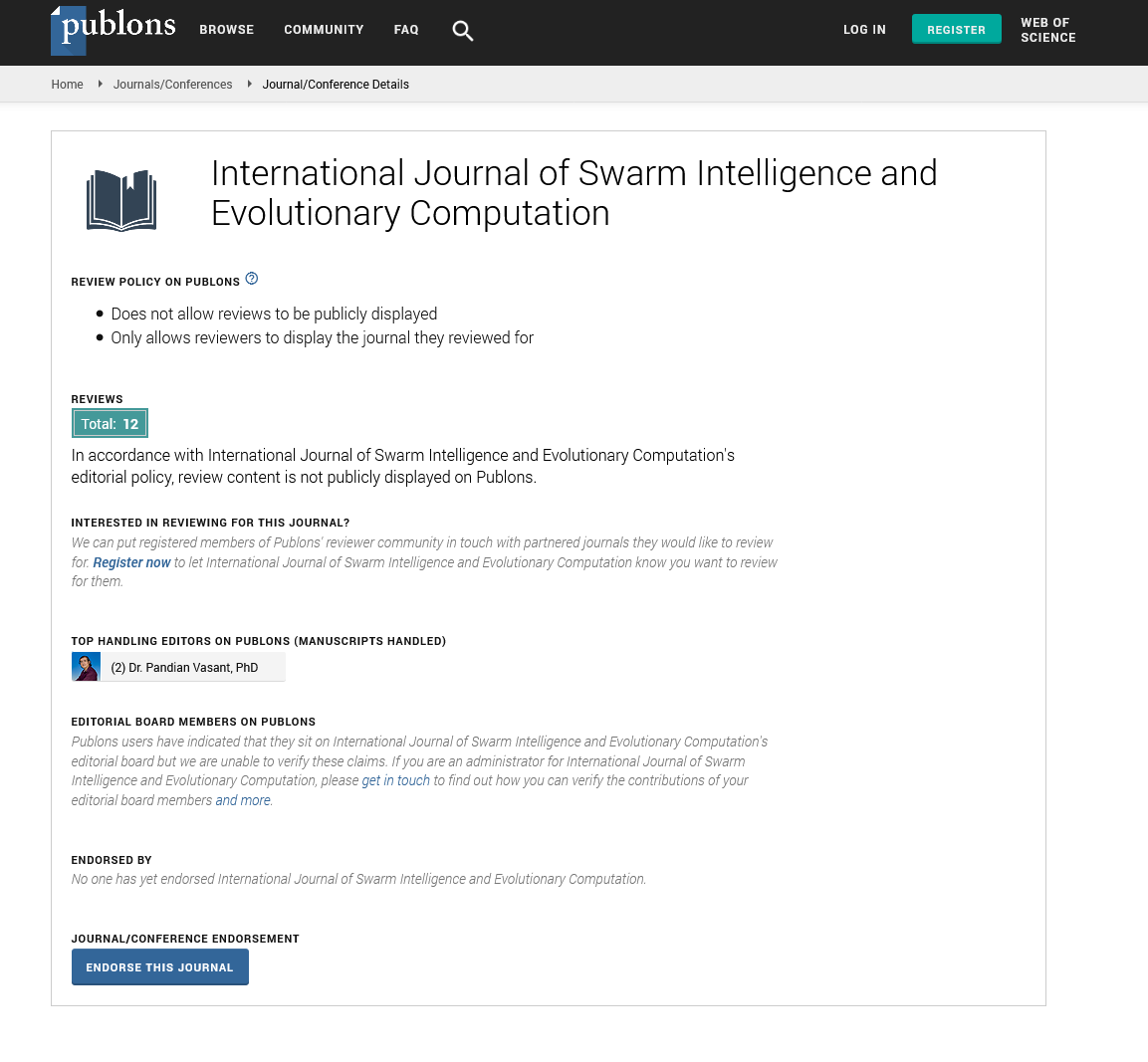Indexed In
- Genamics JournalSeek
- RefSeek
- Hamdard University
- EBSCO A-Z
- OCLC- WorldCat
- Publons
- Euro Pub
- Google Scholar
Useful Links
Share This Page
Journal Flyer

Open Access Journals
- Agri and Aquaculture
- Biochemistry
- Bioinformatics & Systems Biology
- Business & Management
- Chemistry
- Clinical Sciences
- Engineering
- Food & Nutrition
- General Science
- Genetics & Molecular Biology
- Immunology & Microbiology
- Medical Sciences
- Neuroscience & Psychology
- Nursing & Health Care
- Pharmaceutical Sciences
Editorial - (2021) Volume 10, Issue 1
Computer Algorithms to Pick Out Specific, Distinctive Details about a Person's Face
Alain Stevenin*Received: 01-Jan-2021 Published: 28-Jan-2021, DOI: 10.35248/2090-4908.21.10.e198
A biometric identification system could be a technology capable of matching a person's face from a digital image or a video frame against a database of faces, typically employed to authenticate users through ID verification services, works by pinpointing and measuring facial expression from a given image. Although the accuracy of biometric identification systems as a biometric technology is less than iris recognition and fingerprint recognition, it's widely adopted because of its contactless process. biometric identification systems are deployed in advanced human-computer interaction, video surveillance and automatic indexing of images.
On a graphics tablet an individual's had to pinpoint the coordinates of countenance like the pupil centers, the within and out of doors corner of eyes, and therefore the widows peak within the hairline. The coordinates were accustomed calculate 20 distances, including the width of the mouth and of the eyes. a personality's could process about 40 pictures an hour during this manner and then build a database of the computed distances. A computer would then automatically compare the distances for every photograph, calculate the difference between the distances and return the closed records as a possible match.
Additionally, face recognition has been accustomed target people engaging in protected speech. within the near future, face recognition technology will likely become more ubiquitous. it's going to be wont to track individuals’ movements go into the planet like automated car place readers track vehicles by plate numbers. Real-time face recognition is already being employed in other countries and even at sporting events within the us. Some face recognition systems, rather than positively identifying an unknown person, are designed to calculate a probability match score between the unknown person and specific face templates stored within the database. These systems will offer several potential matches, ranked so as of likelihood of correct identification, rather than just returning one result.
When researching a face recognition system, it's important to seem closely at the “false positive” rate and therefore the “false negative” rate, since there's nearly always a trade-off. As an example, if you're using face recognition to unlock your phone, it's better if the system fails to spot you sometimes (false negative) than it's for the system to misidentify people as you and lets those people unlock your phone (false positive). If the results of a misidentification is that an innocent person goes to jail (like a misidentification in a very mugshot database), then the system should be designed to possess as few false positives as possible.
The open-source biometric authentication algorithm extracted over 2,000 data points for the study, which were then cross-validated to check the pictures with liberal and conservative faces. in keeping with the results presented within the article, the algorithm was able to correctly predict the orientation in 72% of cases within the largest dataset used. The accuracy varied between 70-73% across all datasets before and 65-71% after controlling for demographics.
Concerns over identity verification use publically spaces in China, like shopping malls and scenic spots, caught public attention in 2019 when the primary lawsuit challenging the employment of face recognition within the country was filed by Guo Bing, an associate law professor at Zhejiang Sci-Tech University, against a wildlife park in Hangzhou. Traditionally the stress on privacy and private data protection among Chinese citizens has not been as high as their counterparts in other jurisdictions,” said Catherine Zheng, a partner at firm Deacons. Despite Chinese citizens are sceptical towards the misappropriation of sensitive personal information for unethical commercial practices.
Citation: Stevenin A (2021) Who is Computer Algorithms to Pick Out Specific, Distinctive Details About a Person's Face. Int J Swarm Evol Comput. 10:e198.
Copyright: © 2021 Stevenin A. This is an open-access article distributed under the terms of the Creative Commons Attribution License, which permits unrestricted use, distribution, and reproduction in any medium, provided the original author and source are credited.


